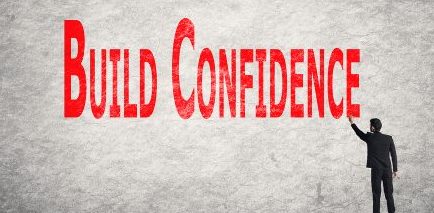In order to build self-confidence one must set and achieve goals – thereby building competence. Without working to build a foundation of competencies, you don’t have authentic self-confidence; you have shallow over-confidence, with all of the issues, upset and failure that this brings.
Self-confidence is built by setting goals and achieving them. It a feeling built upon a foundation of self esteem and self worth, often achieved through hard work on education, goals, and career expertise. When I’m working with my coaching clients, they often reveal goals that are intertwined with their identity and sense of self worth.
- “If I’m not in a top executive position by age 40, then I’ll consider myself a big failure.”
- “I plan to earn 6 figures by 30; I’ve just got to do it, it’s what I deserve.”
- “I want to be married with two children in the next five years, and still be in a leadership role in my company.”
There’s nothing wrong with setting high goals and driving relentlessly towards them. Indeed, such goals become personal priorities. The problem is that often we can’t control many exterior factors. And, no one can deny that choosing one priority also means putting off and saying “no” to other activities. The primary goal or dream becomes the sole focus.
To achieve lofty goals requires personal strength and resolve along with unshakable self confidence. Let’s explore the foundation of self confidence: underlying feelings of self worth and self-esteem.
According to Glenn R. Schiraldi, Ph.D, author of 10 Simple Solutions for Building Self-Esteem, self-esteem is built from three factors: unconditional worth, unconditional love and growth.
- Unconditional Worth: This means that one’s worth isn’t increased or diminished by external factors, but is based on our true value as a human being. This can be confusing to people who have learned they must achieve and acquire in order to be considered worthy.Once we believe in our intrinsic worth, we are relieved of the need to judge ourselves and others, or compare and compete on external values and factors. We can choose to value our own innate capacities and see the many ways we contribute to the well-being of ourselves and others.
- Unconditional Love: Abraham Maslow noted that psychological health is not possible without love for the essential core. Even those who have not experienced unconditional love from parents can learn to provide love to themselves and others. Love helps us experience our worth, feel satisfaction, and enjoy growth and life.
- Growth: We feel better about ourselves when we are living constructively, learning, making decisions, developing and growing. Growing does not change our core worth, but it helps us experience it with greater satisfaction.
When considering growth, it’s important to observe what our mindset is. Mindset (fixed vs. growth) is our belief about our most basic qualities, such as talent, intelligence, and personality. (Dweck, Carol, Mindset: The New Psychology of Success. New York: Ballantine Books, 2006)
Fixed mindsets are characterized by the belief that one’s basic qualities are fixed–as if genetically predetermined. Individuals with fixed mindsets believe that practice has no relationship to performance success, and has been shown to be maladaptive across domains.
Growth mindsets are characterized by the belief that talents and abilities are things that are developed through effort, practice and instruction. Individuals with growth mindsets feel that they control their success, rather than external forces, so they are better able to problem solve and persist through setbacks.
Success is not just luck although it may seem so when someone is in the right place at the right time. It also requires strong personal foundations of self-esteem. Self-esteem is a sense of satisfaction that comes from recognizing and appreciating our intrinsic worth; it encourages us to choose to love and grow. It’s not based upon comparing and competing. We can enhance and enjoy our sense of self worth through learning, growing, achievements and goals.
Does this make sense to you? I’d love to hear your thoughts on this. As always, I can be reached here or on LinkedIn.

Did You Enjoy This Article?
Join thousands of other smart business owners like yourself & get our Proffittable Times newsletter.
It's filled with actionable content you can apply immediately.
Sign up now to get started!
– Coach Nancy










